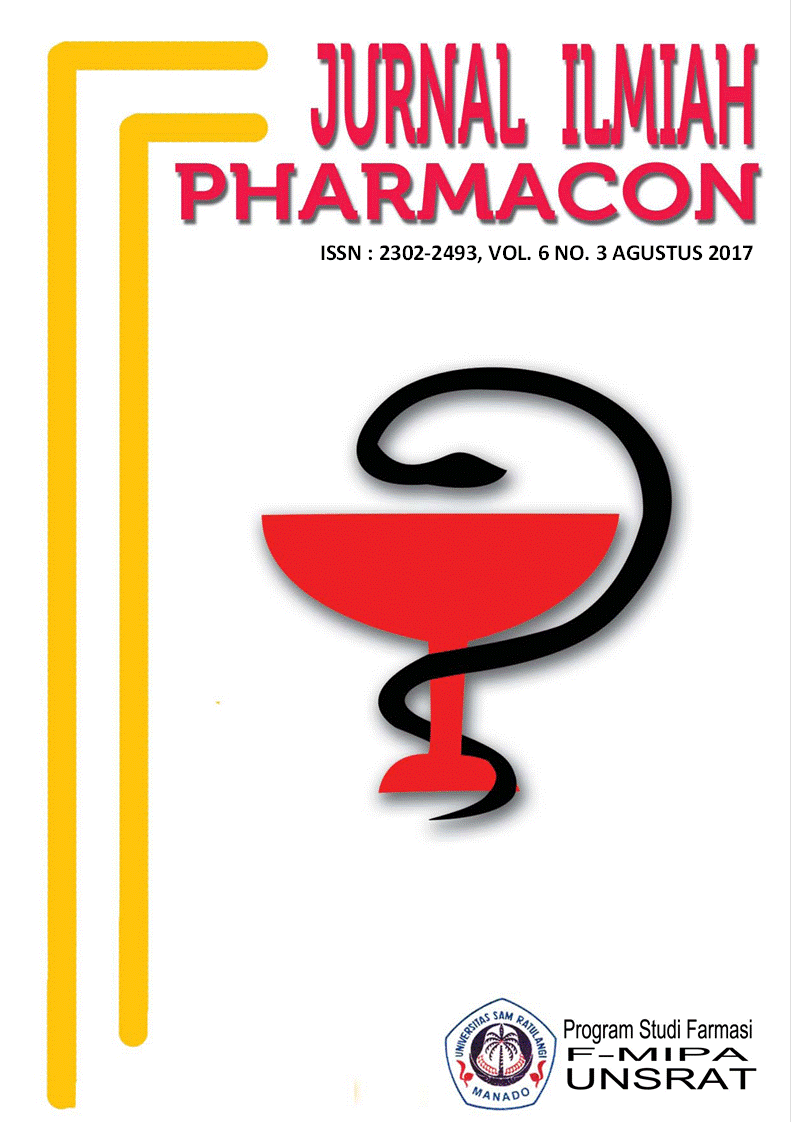PENGARUH PEMBERIAN EKSTRAK DAUN SIRIH (Piper Betle L.) TERHADAP SPERMATOGENESIS TIKUS PUTIH JANTAN GALUR WISTAR (Rattus norvegicus)
DOI:
https://doi.org/10.35799/pha.6.2017.16802Abstract
PENGARUH PEMBERIAN EKSTRAK DAUN SIRIH (Piper Betle L.) TERHADAP SPERMATOGENESIS TIKUS PUTIH JANTAN GALUR WISTAR (Rattus norvegicus)
Â
Jofter Julian Longdong1), Edwin De Queljoe1), Adithya Yudistira1)
1)Program Studi Farmasi FMIPA UNSRAT Manado, 95115
Â
ABSTRACT
Â
Problems in Indonesia today, the increase in the number of very high population, should be developed methods of contraception in men safe, effective, and easy to apply. Betel leaf (Piper betle L.) contains phenol, alkaloids and tannins that have been used as traditional natural antifertility. The purpose of this study to determine the conferral effect of betel leaf extract against male wistar rat spermatogenesis. This research is experimental with complete randomized design. Research subjects were 24 male wistar strains divided into 4, Group 1 was not treated and as negative control and Group 2-4 were treated with different doses of 200, 400 and 800 mg. The treatment was performed for 50 days according to the spermatogenesis cycle. Assessment of spermatogenesis was measured by assessment of the Johnson spermatogenesis score on seminiferous tubules. The results of the investigation showed that there were significant differences in the inter-group spermatogenesis process shown by the Kruskal-Wallis test. It can be concluded that the active substances present in betel leaf may affect the spermatogenesis process of male white rats wistar strains by inhibiting spermatozoa production. It is recommended that betel leaf extract may be considered to be use as a natural contraceptive for men.
Â
Keywords: Spermatogenesis, antifertility, betel leaves (Piper betle L.), male wistar rat (Rattus norvegicus)
Â
ABSTRAK
Â
Permasalahan di Indonesia saat ini, terjadinya peningkatan jumlah penduduk yang sangat tinggi, perlu dikembangkan metoda kontrasepsi pada pria yang aman, efektif, dan mudah diaplikasikan. Daun sirih (Piper betle L.) mengandung fenol, alkaloid dan tannin yang telah digunakan sebagai antifertilitas alami secara tradisional. Tujuan dari penelitian ini untuk mengetahui pengaruh pemberian ekstrak daun sirih terhadap spermatogenesis tikus putih wistar jantan. Penelitian ini bersifat eksperimental dengan rancangan acak lengkap. Subyek penelitian sebanyak 24 ekor tikus jantan galur wistar yang terbagi menjadi 4, Kelompok 1 tidak diberi perlakuan dan sebagai kontrol negatif dan Kelompok 2-4 diberi perlakuan dengan dosis yang berbeda-beda yaitu 200, 400 dan 800 mg. Perlakuan dilakukan selama 50 hari sesuai siklus spermatogenesis. Penilaian Spermatogenesis diukur berdasarkan penilaian skor spermatogenesis Johnson pada tubulus seminiferus. Hasil peneilitian menunjukan terdapat perbedaan yang signifikan pada proses spermatogenesis antar kelompok yang ditunjukkan oleh uji Kruskal-Wallis. Dapat disimpulkan zat aktif yang ada dalam daun sirih dapat mempengaruhi proses spermatogenesis tikus putih jantan galur wistar dengan cara menghambat pembentukan spermatozoa. Disarankan ekstrak daun sirih dapat dipertimbangkan untuk digunakan sebagai kontrasepsi alami untuk pria.
Â
Kata kunci: Spermatogenesis, antifertilitas, Daun Sirih (Piper betle L.), Tikus putih jantan galur wistar (Rattus norvegicus)
Â
Downloads
Published
How to Cite
Issue
Section
License
Authors who publish with this journal agree to the following terms:
- Authors retain copyright and grant the journal right of first publication with the work simultaneously licensed under a Creative Commons Attribution-NonCommercial 4.0 International License that allows others to share the work with an acknowledgement of the work's authorship and initial publication in this journal.
- Authors are permitted and encouraged to post their work online (e.g., in institutional repositories or on their website) prior to and during the submission process, as it can lead to productive exchanges, as well as earlier and greater citation of published work (See The Effect of Open Access)










